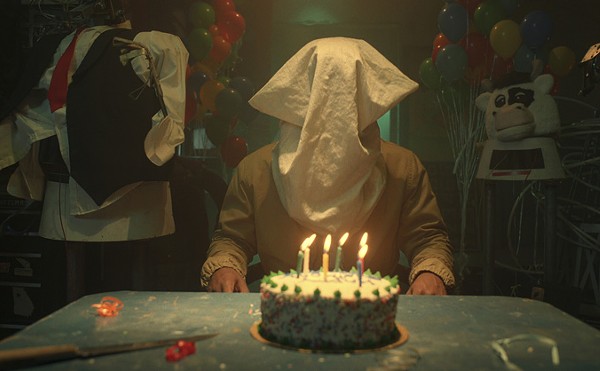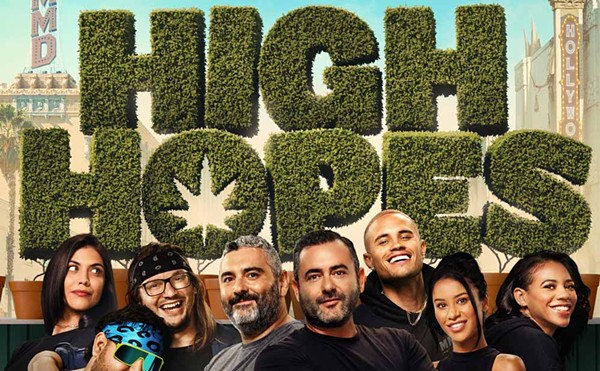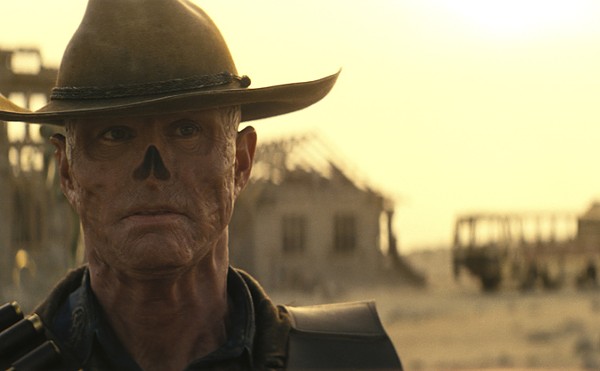Studio: Warner Home Video
WorkNameSort: Katharine Hepburn 100th Anniversary Collection
In Hollywood, nothing is sacred ' except perhaps Katharine Hepburn. If she were still alive, she'd have turned 100 this year. So to celebrate the theoretical occasion, Warner Home Video has just released the Katharine Hepburn 100th Anniversary Collection, containing six of her films that have never before been available on DVD. There are no masterpieces in this bunch, but most of them are at least watchable and all could be called curiosities.
Morning Glory, the best of the six, is also the oldest, having opened in 1933. Hepburn plays Ada Love, a stagestruck lass from small-town Vermont, who has just arrived in Manhattan.
'Either I'm a rotten actress or I'm a great actress,â?� she says when she gets a little drunk. 'I'm not just a pretty good actress.â?� Ada, who changes her name to Eva Lovelace because she thinks it'll look better on a Broadway marquee, will, it turns out, do pretty much anything for a part in a play.
It's not hard to guess why Hepburn earned her first of four Oscars for her role in Morning Glory (which also stars Douglas Fairbanks Jr. and Adolphe Menjou). For one thing, the film's about acting, which undoubtedly would have interested academy voters. But her Oscar victory probably also had a lot to do with her unemphatic yet somehow passionate delivery, a stylized approach to dialogue that was a new flavor in those days. It also must have helped that the plot calls for Hepburn to perform Hamlet's big soliloquy and one of Juliet's speeches ' and that she rises admirably to these occasions.
Fans of the films that Hepburn made with Spencer Tracy may be pleased to learn that their Without Love (1945) is now on DVD. She's a woman with an interest in science and a big house in Washington, D.C. He's a scientist on a secret government assignment. A wartime housing shortage draws them together, even though they've both renounced romance. In the interest of science, and for the good of the country, they embark on a marriage of convenience.
While Without Love isn't top-notch Hepburn-and-Tracy, like Adam's Rib or State of the Union, it's still proof that these people had something special going on. Although the script actually sinks to having Tracy sleepwalk, it was at least written by Philip Barry, who also wrote the delightful Holiday and The Philadelphia Story, the latter a personal triumph for Hepburn. Lucille Ball is great fun here as a tart-tongued real-estate agent and Keenan Wynn is amusing as a nerdy socialite.
Sylvia Scarlett (1936) is notable mainly because it was directed by George Cukor, with whom Hepburn made 10 pictures, and because she co-stars with Cary Grant, with whom she would go on to appear in such classics as Bringing Up Baby. There's a certain wan charm to this film, in which Hepburn and Grant play members of a troupe of con artists who give up crime to become traveling performers. The gimmick is that for most of the movie Hepburn's character poses as a boy. She looks provocatively Peter Pan-ish, but the booming voice that her character affects as part of her disguise ruins the effect. The show is stolen by Grant, who, for the first time in his career, taps the deep reserves of charm that soon would make him a star.
It's almost a tossup as to whether Dragon Seed (1944) or Undercurrent (1946) is the worst entry in this collection. You'd probably have to give it to the former because, at 148 minutes, it's longer by more than a half-hour.
Based on the Pearl S. Buck bestseller, Dragon Seed features Hepburn, Walter Huston, Agnes Moorehead and other assorted Anglos playing Asians and speaking like fortune cookies. Meanwhile, in the bland melodrama Undercurrent, Hepburn portrays a young bride whose handsome husband (Robert Taylor) harbors a horrible secret. (Not even the great Robert Mitchum, who pops up briefly, can redeem this turkey.)
The odd film out here is The Corn Is Green (1978), which, unlike the others, isn't from the '30s or '40s. Also, it's not a feature film, but rather a made-for-TV movie. Based on Emlyn Williams' endearingly middlebrow play, it marks Hepburn's final collaboration with director Cukor. As an aging schoolteacher in a Welsh mining town of the early 1900s, Hepburn is a tad too adorable in that way that Martin Short likes to spoof, but she's still fairly entertaining. When the teacher she plays discovers that one of her students is exceptionally intelligent, she bends every effort to help him.
This birthday collection pretty much sticks to basics: just the films, their trailers and a handful of vintage live-action and animated shorts. Whatever their individual merits, the half-dozen Hepburn features, taken together, do reveal something about the scope of her career: Unlike Eva Lovelace, sometimes she's a rotten actress, sometimes she's a great actress and, yes, sometimes she's just a pretty good actress.















